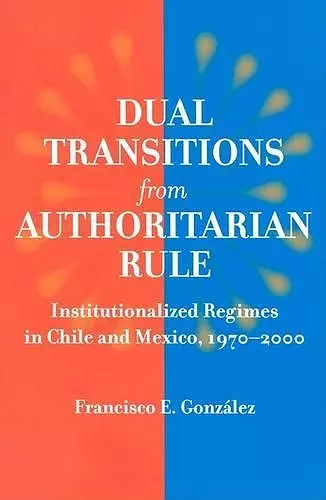Dual Transitions from Authoritarian Rule
Institutionalized Regimes in Chile and Mexico, 1970–2000
Format:Paperback
Publisher:Johns Hopkins University Press
Published:13th May '08
Currently unavailable, and unfortunately no date known when it will be back

A valuable study of an important but quite neglected topic: the various political and economic dynamics of authoritarian regimes and their consequences for subsequent transition to democracy. It will interest students of these broader issues, not only of Chile and Mexico. -- Guillermo O'Donnell, University of Notre Dame This is a valuable addition to the comparative democratization literature. It makes important contributions in three areas: analytical, methodological, and empirical. The non-reductionist treatment of processes of 'dual transition' is a real improvement on earlier mechanistic ideas of 'sequencing.' The 'paired comparison' of Chile and Mexico shows how macro-historical work can be made more social scientific. And the case studies are important in their own right. -- Laurence Whitehead, Nuffield College, University of Oxford
This book will interest scholars of Latin American politics, democratization studies, market reform, and comparative politics and international relations.Latin America's region-wide 1982 economic collapse had a drastic effect on governments throughout Central and South America, leading many to the verge of failure and pushing several of the most stridently authoritarian-Argentina, Bolivia, Brazil, and Uruguay-over the brink. Surprisingly though, Chile's repressive military dictatorship and Mexico's hegemonic civilian regime endured amid the economic chaos that rocked the region. Dual Transitions from Authoritarian Rule explains why the regimes in these two nations survived the financial upheaval of the early 1980s and how each progressed toward a more open, democratic, market-driven system in later years. Using an in-depth comparative analysis of Chile and Mexico, Francisco Gonzalez explains that the two governments-though quite different ideologically-possessed a common type of institutionalized authoritarian rule that not only served to maintain the political status quo but, paradoxically, also aided proponents of political and economic liberalization. Featuring a discussion of parallel phenomena in Brazil, Hungary, Taiwan, and South Korea, Dual Transitions from Authoritarian Rule presents a cogent challenge to the received wisdom that sociopolitical and economic change within authoritarian nations must be approached separately. This book will interest scholars of Latin American politics, democratization studies, market reform, and comparative politics and international relations.
Analytically sophisticated and heavily documented with an extensive bibliography. It belongs in all college and university libraries... Highly recommended. Choice 2008 Highly original academic work. -- Russell Crandall Survival Gonzalez's book is a serious attempt to understand the complex processes of political and economic change in Chile and Mexico. It is worth reading, and opens up an important debate about authoritarian rule and its pernicious consequences. -- Reynaldo Yunuen Ortega Oritz Journal of Latin American Studies 2010
ISBN: 9780801888007
Dimensions: 229mm x 152mm x 20mm
Weight: 408g
304 pages